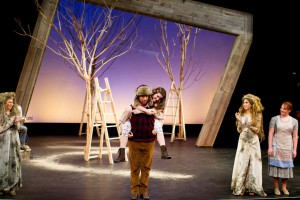The Department of Theatre at Williams combines artistic practice with scholarly inquiry, inspiring students to engage simultaneously in craft and context, creativity and critical thinking. Believing that students learn by doing, we strive to create situations where the unique talents of each can coexist with mentorship and expert artistic guidance. Students who follow appropriate course sequences, and who demonstrate sufficient ability in their work, are encouraged to engage in projects that require a high level of responsibility and skill development.
The department works to create many varieties and levels of student involvement, including traditional classroom interactions; advanced work in acting, design, directing, and scholarship; and mentored relationships with faculty and guest artists. Students create and learn alongside accomplished theatre artists. Many are also granted opportunities to explore their own visions and to exercise their own developing skills through independent projects and self-produced performance.
Taking chances and risking failure intensify learning. In our department we create a safe forum in which students are free to experiment and critically examine the results. Although students will be equipped to proceed to graduate and professional schools in theatre, the major is primarily directed toward those interested in studying theatre as an interpretive and communicative tool, and finally as an artistic phenomenon.






Megamenu Social